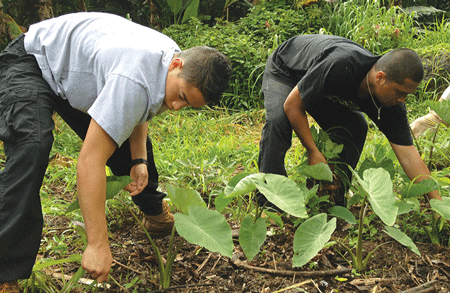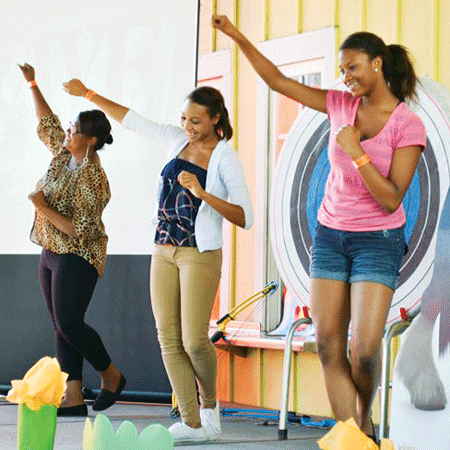Listen to this article
Listen to this article
Loading
Play
Pause
Options
0:00
-:--
1x
Playback Speed- 0.5
- 0.6
- 0.7
- 0.8
- 0.9
- 1
- 1.1
- 1.2
- 1.3
- 1.5
- 2
Audio Language
- English
- French
- German
- Italian
- Spanish
Open text
hawaiian troubled youth connect with the land. christopher and noland, from the ke kama pono safe house program, tend the land.photo by daniel de castro. the salvation army helps youth discover new purpose and accomplishment. by daniel de castro. teens, ages 14-18, are busy working on land-based projects that provide a sense of purpose and accomplishment as part of the the salvation army hawaiian and pacific island division’s family intervention services ke kama pono safe house program for youth; some are runaways and others have been court-ordered to attend the six-month program for youths at risk. on an early friday morning in north kohala, hosted by the hawaii institute pacific agriculture at the 20-acre site where a “lo‘i kalo” (taro patch) was started two months earlier, the boys listened as sustainable agriculture mentor dash kuhr provided a lesson in banana propagation, and the importance of nurturing native and indigenous varieties to save them from extinction. armed with shovels, picks, hoes and rakes, the boys cleared a swath of land to plant the “keiki” banana and kawa. after two hours of clearing weeds, including the invasive honohono and guinea grass, the land was ready for planting. “i’ve learned so much from this program,” said andrew, 16, as he took a banana sword sucker from noland, 17, and gently placed it inside an opening in the ground. “i knew very little about this land where i’m from, and now i have a greater appreciation and respect for it and the hawaiian culture.”. israel, 17, knows that he will take what he’s learned back home to oahu. “i used to fight; that’s why i’m here,” he said. “but not anymore. i’m learning to change my ways and making it better.”. the community has recognized the boys’ work ethic, intensity and passion for the projects they’re working on, according to anthony savvis, youth development specialist at the salvation army. “the youth that i’ve seen come through the program have definitely changed for the better,” savvis said. “it’s a program that’s needed most on the island and the salvation army has recognized this and has stepped up to the challenge.”. after seven hours, the boys left the farm with sweet potato cuttings that they collected to add to a fast-growing garden of kalo and other vegetables at the shelter.
Open context player
Close context player
Plays:-Audio plays count
hawaiian troubled youth connect with the land. christopher and noland, from the ke kama pono safe house program, tend the land.photo by daniel de castro. the salvation army helps youth discover new purpose and accomplishment. by daniel de castro. teens, ages 14-18, are busy working on land-based projects that provide a sense of purpose and accomplishment as part of the the salvation army hawaiian and pacific island division’s family intervention services ke kama pono safe house program for youth; some are runaways and others have been court-ordered to attend the six-month program for youths at risk. on an early friday morning in north kohala, hosted by the hawaii institute pacific agriculture at the 20-acre site where a “lo‘i kalo” (taro patch) was started two months earlier, the boys listened as sustainable agriculture mentor dash kuhr provided a lesson in banana propagation, and the importance of nurturing native and indigenous varieties to save them from extinction. armed with shovels, picks, hoes and rakes, the boys cleared a swath of land to plant the “keiki” banana and kawa. after two hours of clearing weeds, including the invasive honohono and guinea grass, the land was ready for planting. “i’ve learned so much from this program,” said andrew, 16, as he took a banana sword sucker from noland, 17, and gently placed it inside an opening in the ground. “i knew very little about this land where i’m from, and now i have a greater appreciation and respect for it and the hawaiian culture.”. israel, 17, knows that he will take what he’s learned back home to oahu. “i used to fight; that’s why i’m here,” he said. “but not anymore. i’m learning to change my ways and making it better.”. the community has recognized the boys’ work ethic, intensity and passion for the projects they’re working on, according to anthony savvis, youth development specialist at the salvation army. “the youth that i’ve seen come through the program have definitely changed for the better,” savvis said. “it’s a program that’s needed most on the island and the salvation army has recognized this and has stepped up to the challenge.”. after seven hours, the boys left the farm with sweet potato cuttings that they collected to add to a fast-growing garden of kalo and other vegetables at the shelter.
Listen to this article













